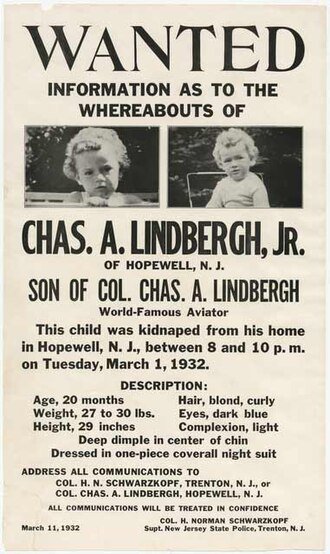In the early hours of March 1, 1932, tragedy struck the Lindbergh family when their 20-month-old son, Charles Lindbergh Jr., was kidnapped from their home in Hopewell, New Jersey. This shocking event would go on to capture the attention of the entire nation and become known as “The Crime of the Century.”
The Lindbergh family was no stranger to the spotlight. Charles Lindbergh Sr., also known as “Lucky Lindy,” had gained international fame for his solo nonstop flight across the Atlantic Ocean in 1927. His achievement made him an instant celebrity and a symbol of American heroism.
However, the Lindberghs’ fame would prove to be a double-edged sword. The high-profile nature of their lives made them vulnerable to those seeking to exploit their wealth and notoriety. It was this vulnerability that would ultimately lead to the tragic kidnapping of their young son.
The Lindbergh kidnapping was meticulously planned and executed. The perpetrator, who would later be identified as Bruno Hauptmann, a German immigrant, had carefully studied the Lindberghs’ routines and security measures. On the night of the abduction, Hauptmann entered the Lindberghs’ home through a window and took the sleeping child from his crib.
News of the kidnapping spread like wildfire, and the nation held its breath as law enforcement agencies scrambled to find the missing child. The Lindberghs received numerous ransom notes demanding a substantial amount of money in exchange for their son’s safe return. Despite their cooperation and the payment of a hefty ransom, the Lindberghs’ worst fears were realized when the lifeless body of their son was discovered weeks later.
The investigation into the Lindbergh kidnapping was one of the largest and most extensive in American history. The case captured the public’s imagination and put tremendous pressure on law enforcement to bring the perpetrator to justice. The evidence eventually led investigators to Bruno Hauptmann, who was found in possession of a portion of the ransom money.
Hauptmann’s trial was a media spectacle, with reporters from around the world flocking to witness the proceedings. The evidence against Hauptmann was circumstantial but compelling. Handwriting analysis, witness testimonies, and the discovery of the ransom money all pointed to his guilt. In 1935, Hauptmann was convicted of first-degree murder and sentenced to death.
The Lindbergh kidnapping had a profound impact on American society. It highlighted the need for stronger laws and law enforcement agencies to combat the rising threat of kidnapping. In response to the crime, Congress passed the Federal Kidnapping Act, making kidnapping a federal offense. This legislation allowed federal authorities to pursue and prosecute kidnappers across state lines.
The Lindbergh kidnapping also brought attention to the issue of capital punishment. Hauptmann’s trial and subsequent execution sparked a nationwide debate over the ethics and effectiveness of the death penalty. The case became a rallying point for abolitionists who argued against the use of capital punishment.
Decades later, the Lindbergh kidnapping continues to fascinate and captivate the public’s imagination. Numerous books, documentaries, and movies have been made about the case, each offering their own theories and interpretations. The Lindberghs themselves went on to advocate for aviation safety and privacy, using their tragedy to bring about positive change.
The kidnapping of Charles Lindbergh’s son in 1932 was a crime that shook the nation to its core. It forever changed the lives of the Lindbergh family and left an indelible mark on American history. The legacy of this tragic event serves as a reminder of the importance of vigilance and the ongoing fight against crime.
SEO Excerpt:
The kidnapping of Charles Lindbergh’s son on March 1, 1932, shocked the nation. Charles Lindbergh Jr., just 20 months old, was abducted from the family’s home in Hopewell, New Jersey. The event led to what was called “The Crime of the Century.” Despite the payment of a substantial ransom, the child was tragically found deceased weeks later. The high-profile crime prompted significant changes in American law enforcement and the introduction of the Federal Kidnapping Act, making kidnapping a federal offense.

